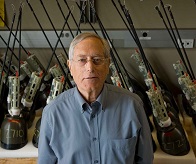
Russ E. Davis
Professor Emeritus of Oceanography
It is with great sorrow that we announce the passing of physical oceanographer Russ Davis, who invented some of the most transformational ocean observing instrumentation in history, died June 9, 2022 at the age of 81.
A physical oceanographer and engineer, Davis’ development of the sounding oceanographic Lagrangian observer (SOLO) float freed ocean exploration from the limits of shipborne measurements that are inherently constrained by costs and the oceans’ own vastness as well as the limits of satellites which cannot not probe the ocean interior to depths more than a few meters.
The float he developed in the 1990s became the backbone of an international network known as Argo, which the New York Times described in 2014 as “one of the scientific triumphs of the age.” The network now has roughly 4,000 floats distributed around the world, supported by contributions from 30 countries.
The floats measure temperature and salinity in the top 2,000 meters (6,560 feet) of the ocean. Being freely drifting, they also provide information on currents. These variables are often called the “vital signs'' of the ocean. Newer Argo generations include floats capable of sinking three times as deep as the originals and others that can measure a suite of biogeochemical conditions. A full complement of Argo floats could thus observe conditions in more than 90 percent of the volume of the oceans.
Davis’ instrument, a precursor of which was developed during the World Ocean Circulation Experiment (WOCE) conducted in the 1990s, has provided data used in more than 5,300 research papers to date. Those studies have assessed ocean warming among other phenomena linked to climate change and Argo provides a vital foundation of reports on the state of the ocean created by the Intergovernmental Panel on Climate Change.
Born March 8, 1941, in San Francisco, Davis received his bachelor’s degree from the University of California, Berkeley, and his PhD from Stanford University, both in chemical engineering. He became an assistant research geophysicist at the Cecil H. and Ida M. Green Institute of Geophysics and Planetary Physics at Scripps Oceanography in 1967. He joined the faculty the following year and founded his Instrument Development Group (IDG) in 1972.
Prior to the 1980s, acoustically tracked floats mapped out currents over small ocean regions. For WOCE, launched in 1990, Davis conceived and co-designed Autonomous Lagrangian Circulation Explorer (ALACE) floats that used satellites for tracking and communication to provide a cost-effective global array. This success led to Argo. Now multiple research centers around the world manufacture floats to augment the network and replace expired floats.
Subsequently, Davis developed robotic gliders known as Spray that can be piloted across strong currents and shallow continental shelves, effectively connecting the coast with the open ocean.
The instruments developed by Davis included surface drifting devices tracked via radio transponders and aircraft piloted by Davis, acoustic Doppler methods to measure current velocity, and eventually satellite technology to track floating profilers for many years.
Davis’s honors include the Maurice Ewing Medal from the American Geophysical Union (AGU), the Prince Albert I Gold Medal from the International Association for the Physical Sciences of the Oceans, the Henry Stommel Medal from the Woods Hole Oceanographic Institution, and the A.G. Huntsman Award from the Bedford Institute of Oceanography in Canada. He also was a member of the National Academy of Sciences and a fellow of the American Academy of Arts and Sciences, the AGU, and the American Meteorological Society.
Davis is survived by his wife, Geri Davis of Del Mar, Calif.; his son, Erik Davis of San Francisco; his sister, Kathy McFarland, of Menlo Park, Calif.; and his step grandson, Alexander Amo of Colorado Springs, Colo. Davis was previously married to Linda Davis of San Diego and Sandi Zarcades of Rancho Santa Fe, Calif.
Pradeep K. Khosla
Chancellor
Elizabeth H. Simmons
Executive Vice Chancellor
David A. Brenner
Vice Chancellor for Health Sciences
Margaret S. Leinen
Vice Chancellor for Marine Sciences
